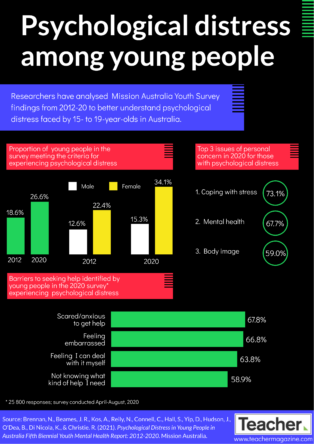What are the personal challenges facing your students before they even make it to school? What are the national issues they are worried about? According to new data from the annual Mission Australia Youth Survey, the environment is now the number one concern for young people, followed by equity and discrimination, and mental health.
But in the last 12 months financial concerns and housing instability have also had an impact. One in 10 (10.4%) of the 18,800 young people aged 15 to 19 who took part in the 2022 survey were worried about having a safe place to stay and 8.4% had spent time away from home because they felt they couldn’t return. Around one in 20 (5.9%) young people or their families couldn’t afford bills or car expenses and 6.4% had sought financial help from their family, friends or a charity.
National issues of concern
Just over half of those surveyed (51%) chose the environment as one of the most important issues in Australia – up from 38% in 2021 and 29.8% in 2020. One-quarter (25.5%) were also concerned about climate change.
More than one-third (35.9%) picked equity and discrimination as important nationally, and 27.1% said they’d been discriminated against in the past 12 months, mostly on the basis of their gender, race/cultural background or mental health.
As in previous years, mental health was a major concern for young people – 33.9% felt it was an important national issue, 28.8% indicated high psychological distress and 23.5% said they felt lonely all or most of the time. More than half of those surveyed (53.4%) said they had needed support with their mental health at some point in their lives.
School challenges and solutions
Young people were asked to explain in their own words, and unprompted, what their biggest personal challenge had been in the last 12 months, what they’d found helpful in dealing with it, and what could be done to help them further.
‘The responses to these questions are a valuable source for understanding the issues and solutions that are top of mind for young people,’ the survey report (Leung et al., 2022) recommends.
‘From their own words, the top personal challenges experienced by young people in the past year centre on the themes of school, mental health, relationships and COVID-19. Four in 10 (41.5%) noted challenges relating to school which included academic pressure, high workload, challenges with teachers or learning difficulties.
‘These challenges exist in the context of years of COVID-19 disruption, with almost three quarters (73.2%) of young people saying the pandemic has negatively impacted their education, up from 62.3% in 2021.’
One in 5 young people felt pressure to achieve good grades (20.7%) and struggled balancing school and non-school commitments (20.2%).
‘I am put under a lot of pressure by my family to do well at school. I know they just want me to have the best choices in life, but sometimes it gets too much. Sometimes it seems like my grades is all we talk about.’ (Female, 16, Western Australia, non-Indigenous)
The survey report says a small proportion of those surveyed (2.7%) identified challenging relationships with school staff and wanting better support from their school.
The vast majority of young people (85.8%) were studying full-time and 62.6% said they were satisfied or very satisfied with their studies. However, 41.8% said there are barriers to achieving their study or work goals – the top 3 being mental health, academic ability and financial difficulty.
When asked what would help them address school-related challenges, young people spoke about having more balanced and manageable workloads:
‘Having more information about how to deal with school in a balanced way and how to study effectively so you still have time to yourself to do things that make you happy.’ (Female, 18, Victoria)
‘Having more support coming from teachers in the sense of understanding workloads.’ (Female, 16, Victoria)
Help getting organised and managing time:
‘Teachers helping students to create a study timetable or implement study in class so we don’t spend so much time studying at home when we could do study/homework during the school day.’ (Female, 16, New South Wales)
Helping parents understand my deadlines and stress at school:
‘Inform parents about the stress around grades, teachers always say that marks don’t matter but they do to our parents.’ (Female, 17, Victoria)
More understanding from teachers about stress levels:
‘Less stress enforced by teachers when it comes to assessments and tests.’ (Non-binary, 15, Queensland)
The need to study more:
‘Study more and harder.’ Male, 17, New South Wales
Reflecting on what had been helpful in addressing personal challenges, young people said having personal networks of family and friends, taking time out to relax, having support available at school and access to professional support had all worked for them.
References
Leung, S., Brennan, N., Freeburn, T., Waugh, W., & Christie, R. (2022). Youth Survey Report 2022. Mission Australia.
The full survey report, a summary and state and territory breakdowns are available on Mission Australia’s website.
What are the personal challenges facing your students before they even make it to school? What are the challenges they face at school and what would they like more support with? As a school leader, what support systems do you have in place to help students navigate the challenges mentioned in the 2022 report?



